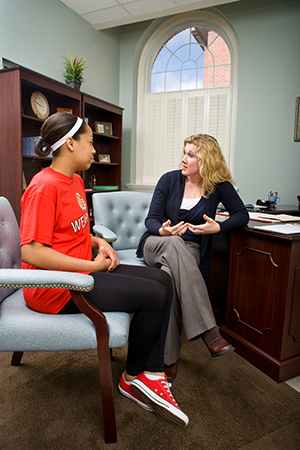Making a Difference One School Counselor at a Time
School counselors play a vital role in helping elementary, middle, and high school students discover their abilities and ambitions. In the counselor education master’s degree program at UL Lafayette, you’ll get the academic and real-world experiences you need, learning from licensed counseling professionals and spending time with students in classrooms across the parish.
Students bring more baggage to the classroom than most adults may realize—maybe it’s divorced parents, financial problems, or a language barrier—and that baggage can inhibit a student’s ability or willingness to learn. School counselors help intervene in students’ lives, making sure that any issues a student has outside school don’t prevent them from becoming successful. We know that well prepared school counselors can help them learn and grow, despite whatever their challenges are.
Our counselor education master’s degree program covers age-appropriate interventions, along with social and cultural perspectives on counseling diverse populations. In our courses, you learn about the relationships that influence a child’s wellbeing, how to work in multicultural environments, and how to counsel both children and adolescents in school settings. Earning your master’s in counselor education here at UL Lafayette means you’ll have the preparation to help students of all ages and in all situations meet their personal, academic, and career goals.
Our school counseling master’s program students also work in local schools as part of the degree requirements, so you gain the practical experience you need to be an effective school counselor.
“Schools are unique places that serve students with different ages, backgrounds, and experiences. Professional school counselors need to be comfortable with different populations to effectively work with all students to remove barriers to learning and achievement,” says Dr. David Spruill, associate professor in the Department of Counselor Education. “In our school counseling track, we work hard to provide relevant and ‘real world’ experiences so our school counselor graduates can step right into their new careers, having the confidence and experience to do great work.”
At the beginning of the master’s in counselor education program, you learn about school counseling as a profession, including the code of ethics, legal considerations, certification, licensing, best and emerging practices, and the roles that school counselors fill. From there, you’ll explore psychometric and clinical methods, data-based treatment planning, development through the life cycle, and career development and career counseling theories.
You’ll also gain fundamental counseling skills for individuals and groups through didactic and experiential methods, along with how to develop and manage comprehensive proactive and reactive counseling programs in schools with a focus on leadership, advocacy, school culture, data management, and systemic change.
“What I think is great about the program is that you get a full immersive experience,” says masters in counselor education graduate Kristen Sison, MS, PLPC. “I learned skills and theories, which are of course helpful and useful, but I feel like I learned so much more from hands on-counseling and sharing during peer supervision.
“It really helped me to hone my intuition of what is helpful and not helpful when working with clients,” she continues. “Giving feedback and hearing that others had the same instincts as me was very validating. Being able to trust myself and my instincts has been invaluable every day because I never know what challenge I will face with my clients day to day.”
Learn more about the counselor education master’s degree program >
